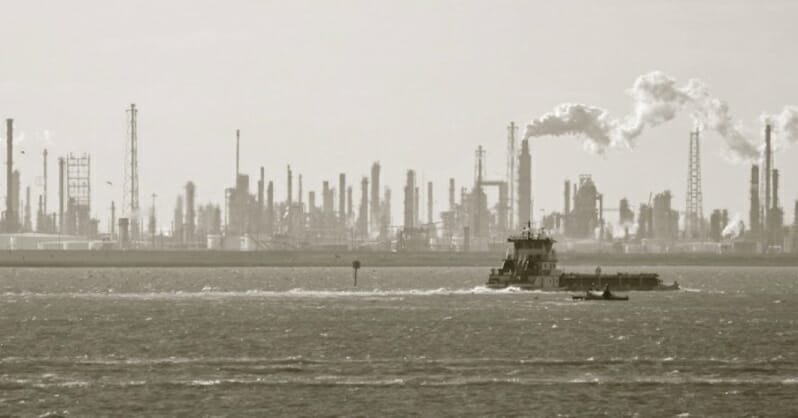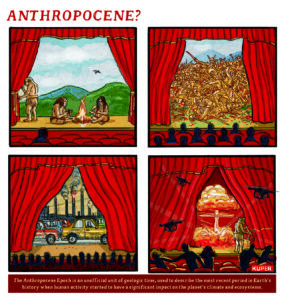G-20 Urged to End Public Subsidies of All Dirty Fuels by 2020
A new report reveals that public financing by the world's wealthiest governments belies their nations' stated commitments to the Paris climate goals. A view of oil refineries from the Galveston Channel in Texas. (Roy Luck / flickr)(CC-BY)
A view of oil refineries from the Galveston Channel in Texas. (Roy Luck / flickr)(CC-BY)
By Andrea Germanos / Common Dreams
Extreme weather trends continue. CO2 emissions remain above the safe threshold. And President Donald Trump’s decision to ditch the Paris climate pact underscores the need for other world leaders to live up to their promises to uphold the accord.
But a new report by a group of environmental advocacy organizations presents a sobering finding: G-20 governments are bankrolling fossil fuel projects big time. In fact, they’re pouring four times more public finance into fossil fuels than they are into clean energy projects.
Released Wednesday by Oil Change International, Friends of the Earth U.S., the Sierra Club, and WWF European Policy Office, Talk Is Cheap: How G-20 Governments Are Financing Climate Disaster shows that between 2013 and 2015, public fossil fuel financing from these countries added up to over $71.8 billion annually. The bulk of that amount—84 percent—funded oil and gas projects. Public financing for clean energy, meanwhile, averaged just $18.7 billion annually during that time frame.
“Our research shows that the G-20 still hasn’t put its money where its mouth is when it comes to the clean energy transition. If other G-20 governments are serious about standing up to Trump’s climate denial and meeting their commitments under the Paris Agreement, they need to stop propping up the outdated fossil fuel industry with public money,” said Alex Doukas senior campaigner at Oil Change International and report co-author.
This public finance comes by way of insurance, loans, and grants, and is provided by national and multilateral development banks, export credit agencies, and majority state-owned domestic banks, the report explains.
“Particularly egregious,” the report says, is that G-20 public finance for exploration for new reserves of fossil fuels averaged $13.5 billion a year. But “most already-discovered reserves must remain unburned to avoid the worst impacts of climate change.”
Japan had the dubious honor of the biggest fossil fuel financer, averaging $16.5 billion annually for 2013-2015. For comparison, its support for clean energy finance for that time frame averaged $2.7 billion a year.
The United States, for its part, averaged $6 billion annually in public finance of fossil fuel projects, compared to $1.3 billion for clean energy projects.
G-20 governments’ public financing of fossil fuel projects presents a three-pronged dagger to climate change efforts, the groups argue. From the report:
Lowering the cost of carbon emissions, thus undermining carbon pricing: To the extent that it functions as a subsidy to fossil fuel production, public finance for fossil fuels provides an incentive to emit carbon, encouraging higher levels of fossil fuel production and consumption. In this way, government spending to support fossil fuel production acts as a negative carbon price, pulling in the opposite direction of climate policy and sending confusing market signals.
Driving high carbon lock-in: High carbon lock-in—aided by public finance for fossil fuels—makes the transition to clean energy more difficult and costly.
Making uneconomical dirty energy economical: Public finance subsidizes unburnable carbon, enabling production of ‘zombie energy’—that is, energy that would otherwise be uneconomical to produce.
Among the recommendations for G-20 leaders the report lays out are setting a 2020 deadline for ending the public financing of all fossil fuel projects, including new exploration; expanding support for “truly clean technologies”; and providing support for development countries to make a swift clean energy swift “in line with developed countries’ historical responsibility.”
“The best climate science points to an urgent need to transition to clean energy, but public finance from G-20 governments drags us in the opposite direction. We must stop funding fossils and shift these subsidies,” Doukas said.
The report is released just days before the G-20’s two-day summit in Hamburg, Germany, where climate change is expected to be a major agenda item.
According to Kate DeAngelis, international policy analyst at Friends of the Earth and report co-author, “G-20 countries should take this moment in Germany to start in earnest the massive financial shift from dirty fossil fuels to clean, renewable energy for the entire world.”
Your support matters…Independent journalism is under threat and overshadowed by heavily funded mainstream media.
You can help level the playing field. Become a member.
Your tax-deductible contribution keeps us digging beneath the headlines to give you thought-provoking, investigative reporting and analysis that unearths what's really happening- without compromise.
Give today to support our courageous, independent journalists.









You need to be a supporter to comment.
There are currently no responses to this article.
Be the first to respond.